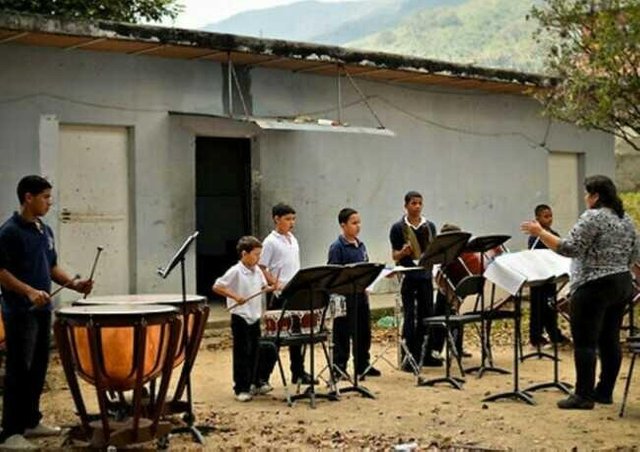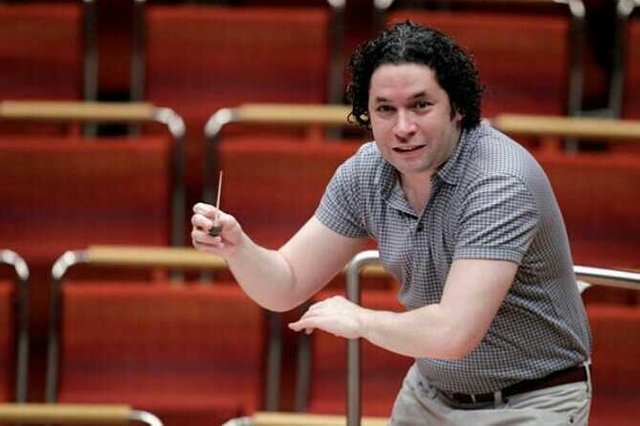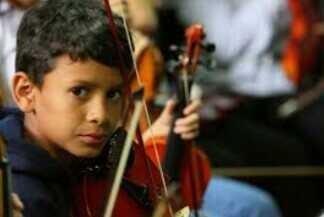Music Venezuelan Socialism "Music is a gift from heaven"

Venezuela has always been a music country where people like to sing, play instruments, join bands, combos, big or small orchestras.
Some videos show President Hugo Chavez singing. He sings on the sidelines of his speech, he sings as he greets his comrades or foreign diplomats. He even sang while visiting the University of Moscow.
In 1975, "El Sistema" was founded in Venezuela by José Antonio Abreu, whose official name is Fondación del Estado para el Sistema Nacional de las Orquestras Juveniles e Infantiles de Venezuela (FESNOJIV).
The National Foundation for Venezuela's National Children's Orgestra System (FESNOJIV) is a non-profit organization that oversees over 120 youth orchestras and instrumental training programs.
About 100,000 children attend "El Sistema" music schools all over the country, both free and low-cost. This is very helpful for young people from poor socio-economic backgrounds.
Its founder, José Antonio Abreu, a Venezuelan economist with a musical passion, said, "music is an important social development agent because it transmits high values-harmony, solidarity, and compassion. It is able to unite the whole community in expressing the noble feelings. "
Hugo Chavez's government saw socialist values in "El Sistema", and funded 90% of administrative costs, and supported the funding of the "El-Sistema" special program.
"El Sistema" is known to rescue youths who are in poor condition from criminal "genster" environments and drug abuse. The aim is to use music to protect children through training, rehabilitation, and prevention of criminal behavior.
In 2007, Chavez presented José Antonio Abreu on his TV show, "Hello President" (Aló Presidente), and announced a new mission of socialist government, the Mission of Music (Misión Musica), with the aim of giving lectures and musical instruments to children Venezuela.
Perhaps the most famous product of "El Sistema" is the prestigious orchestra Simon Bolivar (formerly: the young orchestra Simon Bolivar), but the word "young" is removed from the name, as a music group that has matured and mature professional musicians now. Under the baton of Gustavo Dudamel, they toured the world, performing as a guest star in concerts on five continents.

Gustavo Adolfo Dudamel Ramirez, born in Barquisimieto on January 26, 1981, is Venezuela's most prominent conductor and a well-known violinist. He is the son of a trombonist and a vocal teacher. Learning from an early age, taught by "El Sistema", he took violin lessons and soon afterwards learned the composition. In 1995, he began studying conductor and was appointed music director in 1999.
"El Sistema" is very popular in the eyes of Venezuelan children and their parents. When children register, parents also accompany. They watched the presence of their children.
"El Sistema" also helps street children. Received a clean shirt and free lunch. Furthermore, they are introduced to the world of music and its magical empowerment.
When they graduate from school, they will become trained singers, instrumentalists and conductors. Eighty-five percent of El Systema's students achieved good grades, even very good for musical ability.
"El Sistema" offers more than just music. He also taught the spirit of friendship and help each other. He also teaches life skills such as learning to hear. The musicians are focused on music, on the teacher or the conductor, but above all, they are focused on listening to each other.

"El Sistema" is a self-learning system in which each student becomes a teacher. "El Sistema" has served for about 40 years.
In March 2012, the Venezuelan government distributed about 600 instrumental instruments to schoolchildren in Caracas. This activity is organized by the National Anti-Drugs Agency (ONA) and the Department of Justice as a means of fighting crime.
The instruments distributed were traditional folk instruments: bandola (Venezuelan mandolin), Cuatro (four-string guitar in Venezuela), marakas, and percussion made of dried pumpkin, filled with dried beans.
The government of Hugo Chavez encourages young people to play traditional folk music. Chavez really love this type of music. Coming from Barinas state in Llanos (meadow), Chavez is a big fan of "Musica Llanera", a type of music played by herders playing Jaropo.
Venezuelan Jaropo is a musical style that resembles waltz-Waltz is a kind of ballroom dance and folk dance in a 3/4 beat, performed mainly in a closed position. In 1882, Jaropo became a national dance in the country. Actually, the word means "having a party". Joropo is a festive dance. The grassland community gathered at the Jaropo festival where they met, talked, ate, drank, danced, sang and generally had a good time.
The jaropo festival is also called the marriage market, where boys look at girls and vice versa, where the future couple is chosen and invited to dance first.
The colorful and striking women's costume, women's skirts spinning knee-length with frills of rainbow colors. While men use after the traditional white linen clothes with a wide black hat or stiff white.
Jaropo is a marching dance in march. This dance uses a hand shift, a waltz turn and lots of leg movements. Venezuela regularly performs Jaropo festivals with prizes for the winners.
The socialist project of the Chavez government, "Alma Llanera" (Voice of Grasslands), catapulted over 40,000 children in orchestras of folk art music. For this new project, the government poured 395 million bolivars. This fund is used to support 275 youth orchestra of folk art throughout the country.
The culture of Llanero (herders) is an important part of Venezuela. Here there are 12 million cows in Llanos. The Llanerins watched their shepherds from afar. In the rainy season, shepherds will take their cattle to higher ground to avoid flooding. In the summer, shepherds carry their cattle in the lowlands to get water in the middle of summer and dry.
Over the centuries, the Llaneros developed their own lifestyle with their distinctive music, cuisine, and dance. The annual festival of Llaneros and jaropo attracts the public and tourists.